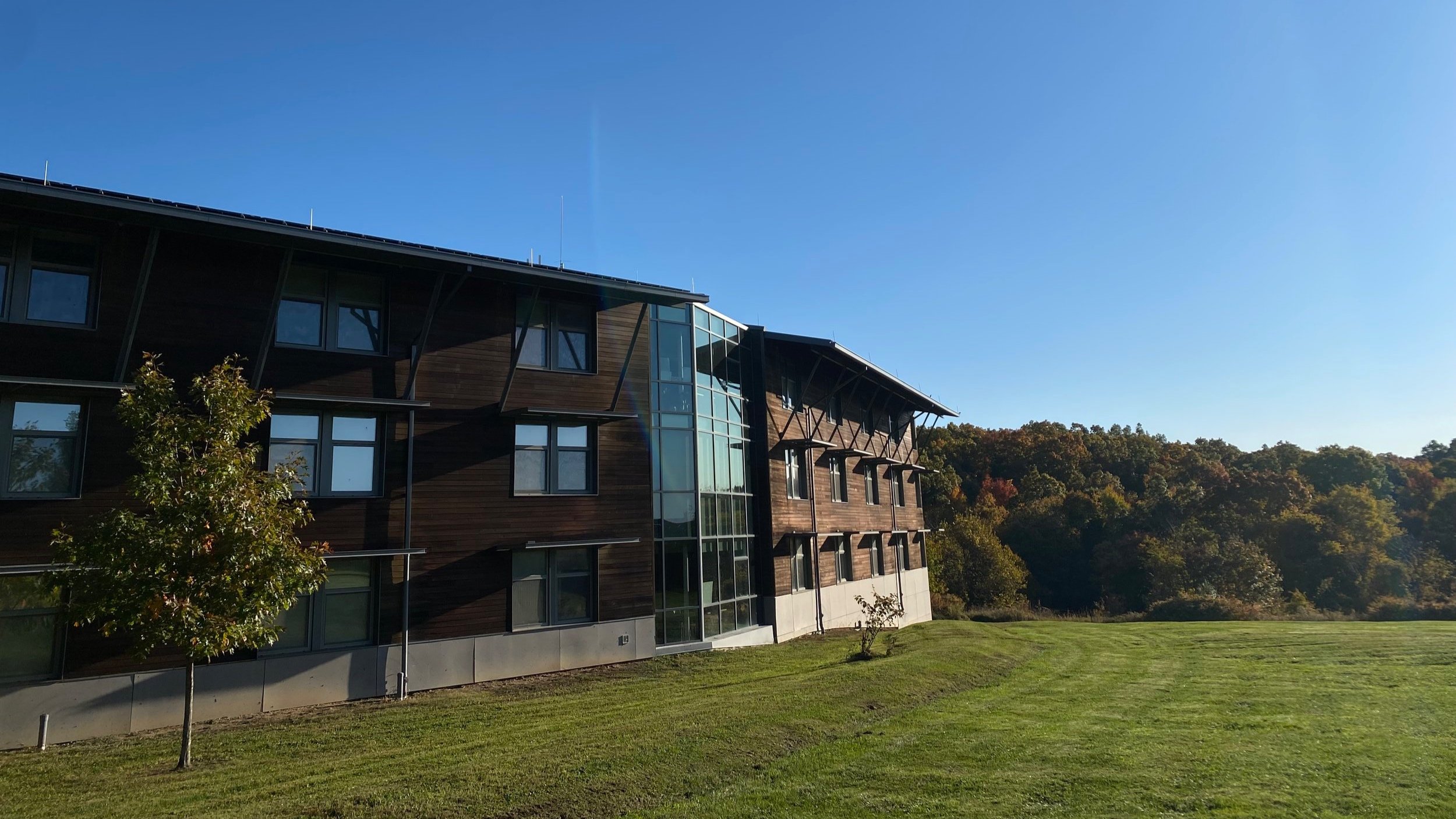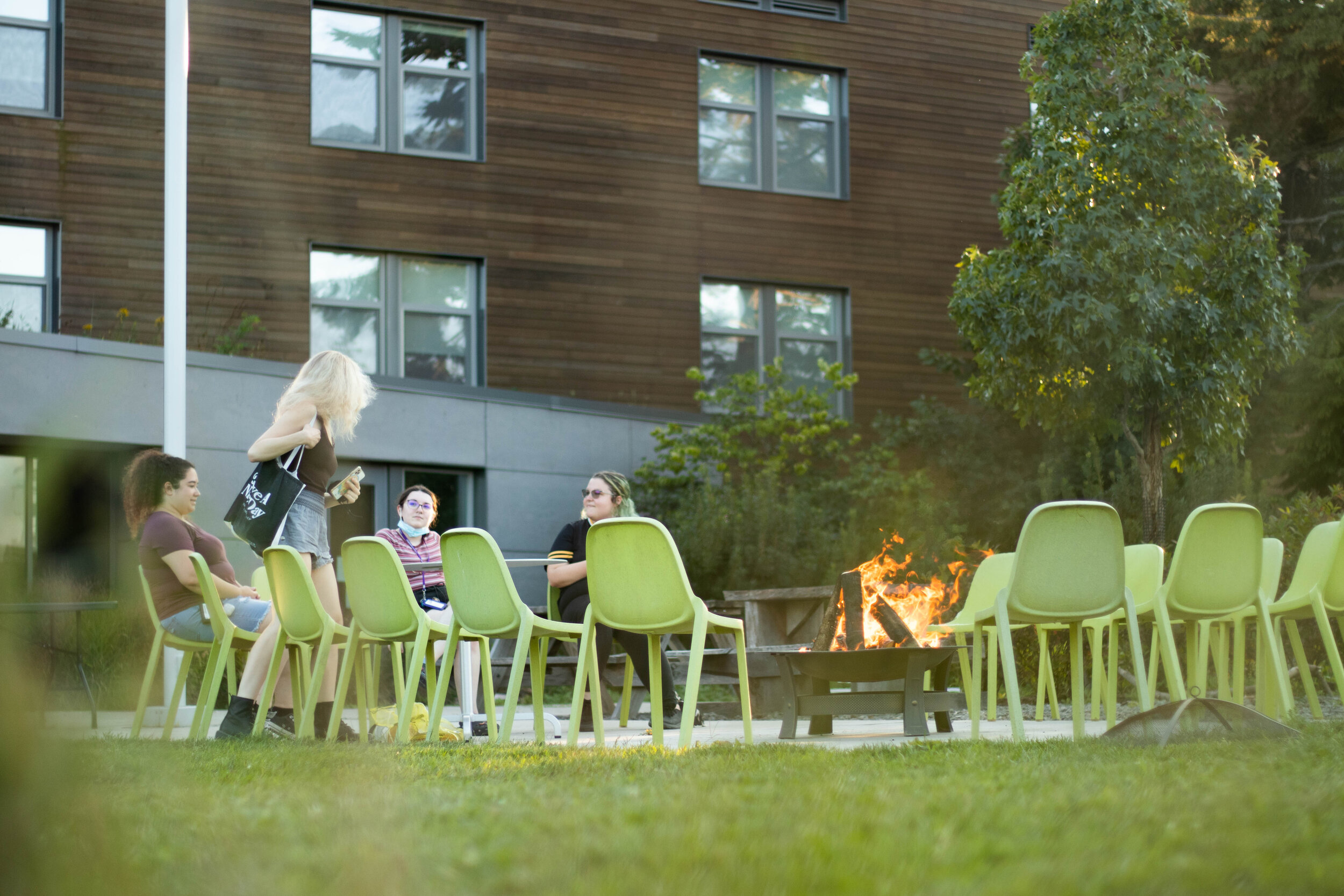Orchard Hall Gives Students a Chance to See Sustainable Living in Action
Orchard Hall soaks up the sun on a clear October morning. (Mick Stinelli)
This story is part of a series exploring the dynamic buildings on Chatham’s Eden Hall Campus.
It’s unlike any other residence hall in the region, maybe the world. When students arrive at Orchard Hall every August, the rolling hills and lush woodlands envelop it in a green calm. In fall, the warm colors of autumn beckon them to explore the apple orchard and smell the dry leaves in the cool air. When the trees are mostly bare in the winter, it’s sometimes possible to look through the branches and see the skyline of the city kissing the horizon. The blossoms of spring inspire daydreams of the future.
The immersive beauty of the campus just north of Pittsburgh is not the only thing that makes this student housing special. Like the rest of Eden Hall Campus, sustainability is at the core of Orchard Hall. It’s designed to be net-positive energy, meaning it can produce more energy from its renewable sources than it uses. It’s also LEED Energy Certified.
“When you live in this building, you’re opting into jumping with both feet into a work in progress and a vision for the future that’s still being realized,” said Mandy Best, the assistant director of residence life and student life at Eden Hall Campus.
A geothermal field supplies heating and cooling to Orchard Hall and several other buildings at Eden Hall, including the Esther Barazzone Center. Since the heat from the EBC’s kitchen often requires it to use more cooling than other buildings on campus, it ejects heat back into the geothermal loop.
According to a case study by Interface Engineering, this allows buildings to share “wasted” energy; heat expelled into the geothermal loop by the EBC can be used in the wintertime by buildings like Orchard Hall, lessening the amount of energy needed to heat the building.
Best, whose office is in Orchard Hall, said the system works well and rarely has issues. Any small hiccups — a particular room that was slow to heat up when the autumn cool came, for instance — are handled promptly by facilities.
Students who live in the residence hall have noticed the speed and enthusiasm with which those issues are addressed, she said.
“Students were joking at the beginning of the year that the Eden Hall facilities team is really fast, has really high standards, and won’t settle for anything less than their standards,” she said. The small campus keeps communication flowing easily, Best added.
It houses up to 60 students in single-room dorms and single-room suites. Modern kitchenettes give students the chance to make their own meals, although the delicious food at the EBC featuring Eden Hall’s own farm-grown ingredients is just down the road. There are also study areas.
Unlike Chatham’s Shadyside Campus, where gilded-age mansions and Georgian-style academic buildings serve as a reminder of the depth of the University’s roots, Orchard Hall is modern and sleek. Its first class of residents, just over two dozen students, came to the building in the fall of 2015.
Students enjoy a bonfire outside Orchard Hall. (Liam Lyons)
Despite its modern design, its brown, wooden exterior allows it to coexist peacefully with the pastoral environment. From its wide windows, students can gaze out at the 388 acres of Eden Hall in all its splendor. The roof is lined with solar panels, which provide electricity to the building and heat its water. (There are over 400 solar panels on the whole campus.)
The land that Eden Hall Campus sits upon was once owned by Sebastian Mueller, an executive in the Heinz food processing empire who joined the company after moving to Pittsburgh from his native Bavaria in 1884. He developed Eden Hall Farm as a wellness retreat primarily for the women workers at the H.J. Heinz Company, who were able to escape the bustle of the city and immerse themselves in the beauty of nature.
With Orchard Hall, students not only have the opportunity to immerse themselves in the natural beauty of Eden Hall, but they get to spend every day and night seeing what sustainable living actually looks like.
“My hope is that these students are able to take what they get from their living experience and take it into the future, so that they feel like they learned some transferrable skills just by living their lives in this space,” Best said.
Oct. 25, 2023 update: This story was edited to include a new introduction.
Mick Stinelli is a writer and digital content specialist at Chatham University. His writing has previously appeared in the Pittsburgh Post-Gazette and 90.5 WESA.


